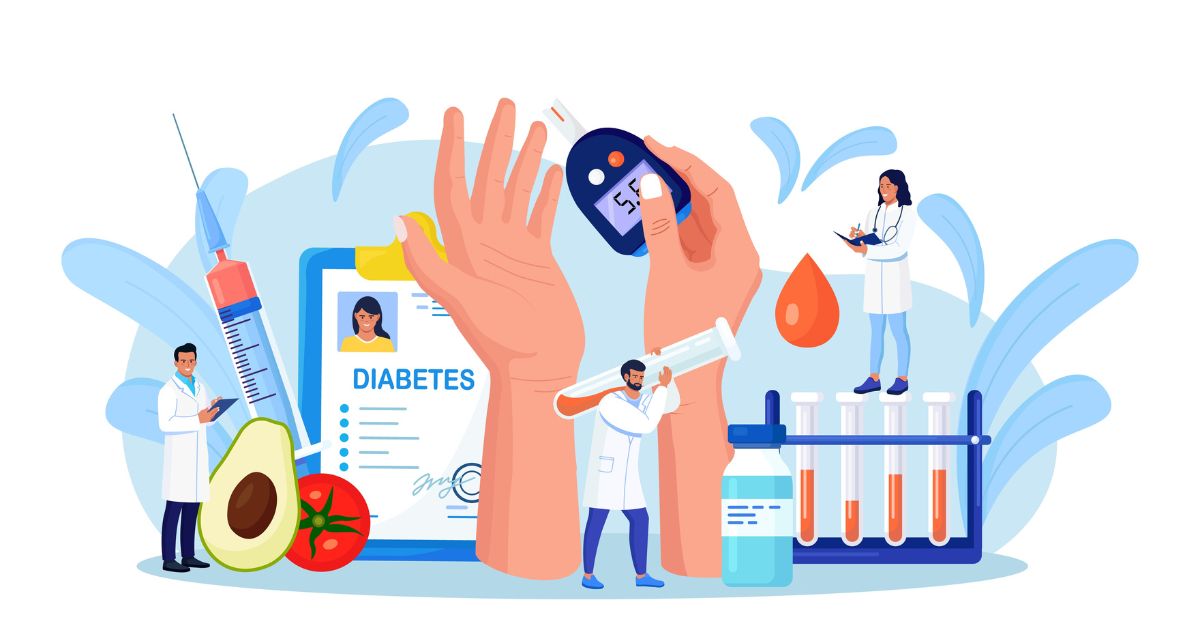Type 1 diabetes mellitus is a chronic disease that occurs when the pancreas, an organ in the abdomen, produces little or no insulin.
Diabetes mellitus is a lifelong condition that can be controlled with lifestyle changes and treatment. Insulin treatment is one component of her treatment regimen for patients with type 1 diabetes.
Insulin therapy replaces or replaces the body’s insulin to achieve normal or near-normal blood sugar levels and prevent or minimize complications. It also poses other problems with how the body stores and processes other forms of energy, including fat. Sugar gets into cells with the help of the hormone insulin.
In type 2 diabetes, the body stops responding to normal or even high insulin levels. Over time, the pancreas (an abdominal organ) no longer produces enough insulin to meet the body’s needs.
Being overweight increases the body’s need for insulin, especially if excess fat is stored in the liver and abdomen. There is a possibility.
people with type 2 diabetes Maintaining target blood glucose levels requires regular monitoring and ongoing treatment. Treatment includes lifestyle adjustments, self-care measures, and medications. We usually combine these approaches.
Our mission is the prevention and treatment of diabetes, a chronic disease that requires ongoing medical care.
While not much has changed, there are some important things to keep in mind when managing diabetes in 2023.
- New recommendations for people with diabetes regarding sleep hygiene and physical activity.
- Cut-off for diagnosis of hypertension.
- New lipid management guidelines call for lower LDL targets in high-risk populations.
- Another important theme is weight loss. obesity and diabetes. Given the availability of new medicines, support for greater weight loss (up to 15%) is emphasized.
Cooperating with lifestyle changes is important
“The most standard lifestyle advice for managing diabetes is the same: eat your veggies, get outside and exercise, and get plenty of sleep.”
Your doctor can help you plan and make informed decisions to better manage your diabetes, but you must play an active role.
Follow the most common type 2 diabetes tips. (Some of these tips are type 1 diabetesbut these people should consult a doctor for specific advice).
Five main steps to incorporate into your daily routine for diabetes management:
The “ABC of Diabetes” refers to three aspects of health that need to be closely monitored in order to control diabetes. blood pressure, and cholesterol. Keeping blood sugar levels at or near target reduces the risk of complications that can affect the eyes, kidneys, and nerves. Additionally, controlling blood pressure and cholesterol reduces the risk of cardiovascular disease, a common complication of type 2 diabetes.
Aim for healthy, uninterrupted sleep.
Experts have long recognized a link between sleep deprivation and obesity.
“Changes in sleep patterns can affect glycemic control.”
“Obstructive sleep apnea (OSA)” is a serious condition of repeated short pauses in breathing throughout the night and is a common cause of sleep disturbance.
This is more common in people with diabetes (especially those who are overweight), so people with typical symptoms of loud snoring during sleep, snoring, wheezing, and daytime sleepiness should not sleep through the night. Sleep Disorders and Diagnosis Sleeping disorder It is common in modern society. The most common sleep disorder is lack of sleep. Patients need to stay in bed longer. Irregular sleep is also common. Many people do not have regular routines and have irregular daily sleep patterns.

Many studies have shown that glucose intolerance is exacerbated by frequent nocturnal awakenings, insufficient sleep, excessive sleep, and irregular sleep patterns. prediabetes in person. Sleep problems have a significant impact on glucose tolerance and are associated with diabetes, prediabetes, and insulin resistance.
Importantly, as a result of modern lifestyles, irregular sleep patterns are increasing risk factors for diabetes.
In addition, sleep disorders such as obstructive sleep apnea (OSA) and insomnia and type 2 diabetes. About two-thirds of people with type 2 diabetes suffer from her OSA. Glycemic control in diabetic patients is affected by its severity. Insulin sensitivity decreases in proportion to the severity of OSA.
All patients should be asked some of the following questions in their medical history:
- What is your work schedule?
- do you sleep well
- when do you go to bed
- what time do you get up?
- How’s your weekend going?
- Do you have a regular bedtime?
There is a short and simple sleep questionnaire that healthcare professionals can give their patients. Diagnosing sleep apnea is not as complicated as many people realize. “Currently, about 60% to 70% of sleep studies for suspected sleep apnea are done using home testing. You have a small finger clip to monitor, an airflow sensor under your nose, and these sensors and devices measure your oxygen saturation, heart rate, airflow, chest and abdomen movement, and position while you sleep.
Don’t “diet”:
Popular diets such as keto, paleo, and intermittent fasting help people lose weight. Instead, it is much more effective to gradually transition to a healthy eating pattern that you can maintain. It’s important for people with diabetes to avoid sodas and other sugary drinks. They should also eat less desserts, sweets, and fatty foods, and eat more high-fiber carbohydrates, such as whole grain breads and brown rice. It is very important to be on time for meals.
meal timing:
For some people, especially those taking long-acting insulin or oral medications that lower blood sugar levels, it is essential to follow eating patterns at consistent times. are at risk of hypoglycemia. High-fat, high-protein meals are broken down more slowly than low-fat, low-protein meals. Using fast-acting insulin before a meal can cause blood sugar levels to drop immediately after eating a high-fat meal and then rise again hours later. may need to adjust mealtime insulin doses to manage this delayed rise in blood sugar levels.
Exercise safely:
Walking is ideal for most people if you start slowly and gradually increase the distance and speed. However, people with diabetes should be very careful when choosing shoes that fit their feet and check their feet regularly for redness, blisters, and sores. This is because diabetes can cause neuropathy (numbness due to damage to nerves). This will prevent you from recognizing minor trauma or injuries to your toes or feet.These can lead to more serious foot problems.
Tackling a healthier weight:
Many obese people need medication for significant weight loss, and the three tips above can help. A healthy weight is associated with a lower risk of weight-related diseases and health problems. Chronic stress, chronic sleep deprivation, excessive calorie intake, and lack of exercise are some of the multiple factors that contribute to weight gain. (depressants, beta-blockers, antipsychotics, corticosteroids, etc.). Controlling excessive weight gain over time and maintaining a stable weight are beneficial, but both are strongly associated with health risks.
Keep, Don’t Earn:
Maintaining a healthy weight can reduce heart disease, stroke, diabetes, high blood pressureand cancer.
Know your treatment goals:
As in the past, most diabetics should aim for HBA1C levels below 7%. It can detect pre-diabetes, which increases the risk of diabetes. It can be used to diagnose diabetes.And it is used to monitor your health diabetes treatment I am working overtime. It is also important to develop a diabetes management plan with your diabetes care team. Achieving this goal, even without losing weight, reduces the risk of serious diabetes complications such as vision, kidney problems, and neuropathy.
Diabetes also increases the risk of heart disease. Target blood pressure is less than 130/80 mmHg. Target LDL cholesterol is reduced by at least 50% (or reached below 70 mg/dL). If you already have heart disease, your doctor may lower your LDL target to 55 mg/dL for him. Many people are advised to take cholesterol-lowering statins to help them reach lower goals. can do.
Gain an edge in diabetes for your overall health!
For people with diabetes, Regular monitoring of blood sugar is an important method to control their diabetes. In addition, It is most important to monitor your blood sugar.
The results of a blood glucose test can help you make decisions about diet, physical activity, and medication.
A blood test may reveal a lot about your sugar health. Test results show average blood sugar levels over the past 2-3 months. The higher the value, the more likely you are to experience complications from diabetes.
Your doctor will tell you how often you need an A1C test, but if your treatment goals are met, it should be done at least twice a year. On the other hand, if you haven’t met your goals or changed your treatment regimen, you may need to have her A1C tested more often.
In addition to annual physicals and regular eye exams, schedule two to four diabetes screenings each year.
During the physical, your doctor will ask you questions about your diet and activity level, and look for complications related to diabetes, including signs of kidney damage, nerve damage, heart disease, and other medical problems. Inspect your feet for any necessary problems.In addition, ophthalmologists can diagnose retinal damage, cataracts, and Glaucoma.
Take care of your feet:
High blood sugar can damage the nerves in your legs and restrict blood flow. Cuts and blisters can cause serious illness if left untreated. Additionally, if you have diabetes, you may experience discomfort, tingling, or lack of sensation in your feet.
take care of your teethbecause diabetics are prone to gingivitis.
Alcohol can cause hyperglycemia or hypoglycemia, depending on how much you drink and eat at the same time. If you do decide to drink, do so sparingly.
if you smoketry to cutback or stopSmoking increases your risk of developing type 2 diabetes and increases your risk of other problems.
Living with diabetes often causes tension, sadness, or anger. Stress raises blood sugar levels But you can learn how to reduce the pressure. For example, deep breathing, gardening, walking, yoga, meditation, hobbies, or listening to your favorite music. Consider joining a diabetes awareness program or a support group that teaches stress management techniques. If you have depression, trying to manage your diabetes can be unsuccessful.
Ask for help when you feel down. Talking to a mental health professional, support group, colleague, friend, or family member who listens to your feelings may help you feel better. Try to get 7-8 hours of sleep each night. Adequate sleep improves mood and energy levels, and also helps maintain blood sugar levels. Plus, our team of medical professionals can help you improve your diabetes self-care. So remember that you are an integral member of your medical team.
https://healthlibrary.askapollo.com/time-for-diabetes-tune-up-2023/ Time for a Diabetes Tune-up in 2023
